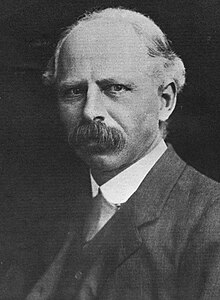
Back ليونارد هوبهاوس Arabic ليونارد تريلاونى هوبهوس ARZ Leonard Trelawny Hobhouse Catalan Leonard Hobhouse Welsh Leonard Trelawny Hobhouse Danish Leonard Trelawny Hobhouse German Leonard Trelawny Hobhouse Spanish لئونارد هابهاوس Persian L. T. Hobhouse Finnish Leonard Trelawny Hobhouse French

Leonard Trelawny Hobhouse, FBA (8 September 1864 – 21 June 1929) was an English liberal political theorist and sociologist, who has been considered one of the leading and earliest proponents of social liberalism.[1][2][3] His works, culminating in his famous book Liberalism (1911), occupy a seminal position within the canon of New Liberalism.[4][5]
He worked both as an academic and a journalist, and played a key role in the establishment of sociology as an academic discipline; in 1907 he shared, with Edward Westermarck, the distinction of being the first professor of sociology to be appointed in the United Kingdom, at the University of London. He was also the founder and first editor of The Sociological Review. His sister was Emily Hobhouse, the British welfare activist.
- ^ Seaman, John W. (1978). "L. T. Hobhouse and the Theory of "Social Liberalism"". Canadian Journal of Political Science / Revue canadienne de science politique. 11 (4): 777–801. ISSN 0008-4239.
- ^ Weiler, Peter (1972). "The New Liberalism of L. T. Hobhouse". Victorian Studies. 16 (2): 141–161. ISSN 0042-5222.
- ^ Griffin, C. M. (1974). "L. T. Hobhouse and the Idea of Harmony". Journal of the History of Ideas. 35 (4): 647–661. doi:10.2307/2709091. ISSN 0022-5037.
- ^ Weinstein, David (1996). "The New Liberalism of L. T. Hobhouse and the Reenvisioning of Nineteenth-Century Utilitarianism". Journal of the History of Ideas. 57 (3): 487–507. doi:10.2307/3653951. ISSN 0022-5037.
- ^ Powell, David (1986). "The New Liberalism and the Rise of Labour, 1886-1906". The Historical Journal. 29 (2): 369–393. ISSN 0018-246X.